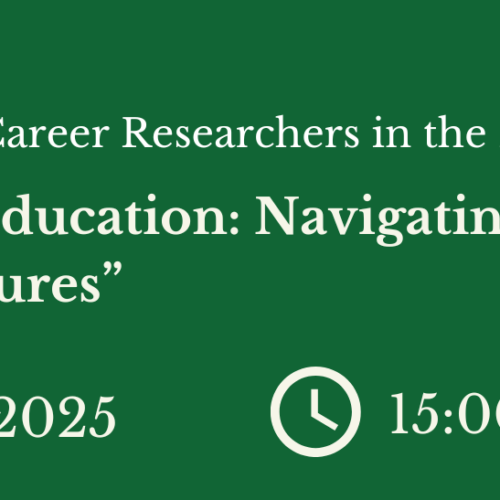Call for Participation – ISCHE Salon Initiative
Special Issue Encounters in Theory and History of Education
Histories of Education: Trends, Absences and Futures
Guest Editors: Ian Grosvenor, Karin Priem, Angelo Van Gorp, Marc Van Overbeke
Deadline for proposals is 15 October 2019.
Submit via: http://historyeducationsalon3.org/
As guest editors of a collaborative project with the editors of Encounters in Theory and History of Education and while featuring another Salon Initiative of the International Standing Conference for the History of Education (ISCHE) we would like to launch a call for participation for a special issue dedicated to international trends, absences and possible futures within History of Education. Encounters in Theory and History of Education is a digital, open access publication, which aims at fostering international and interdisciplinary exchange. We are inviting to contribute to specific sub themes of this special issue while experimenting with new forms of academic writing. In addition, the journal editors will support this special issue by offering innovative web design and new electronic forms of scholarly dialogue. Therefore, this special issue offers a multilayered structure of contents and initiates rigorous exchange around the globe. Our call for collaboration is directed to groups of five to six scholars who should send proposals for one of the sub themes of this special issue as listed below while expressing their commitment to collaborative writing. The individual groups should respect geographical diversity and include scholars of different academic status groups.
The writing process of the different chapters of this special issue is organized as follows and aims at creating a connected community of historians of education:
(1) Each group appoints a group coordinator to manage the writing process.
(2) Each group works in the framework of a blogging platform on a dedicated website to ensure collaborative writing.
(3) The website will consist of an editing (synthesizing) and a dialoguing section (blog); the editing section can be accessed by group members and can be made visible for a wider audience to document the writing process; the blog serves as a space for exchange and feedback and ISCHE members can subscribe to participate.
(4) A final version of all papers on the different sub themes will be subject to blind peer review organized by the guest editors.
(5) Revision of the papers by the different thematic groups.
(6) The digital section of the journal will publish an edited archive of the blog, along with documentation of the writing process.
The thematic scope of this special issue aims at mapping trends, absences and possible or desirable futures of history of education from a global angle while composing a text that includes as many scholars of history of education as possible and assembles many heterogenous voices.
From a global perspective history of education is situated in different disciplinary, national and international contexts and these contexts have facilitated manifold perspectives of (interdisciplinary) research. Therefore, we often use the plural when referring to our field. Research in history of education and the different stories evolving from various local, national and international contexts not only were and are influenced by manifold scholarly traditions, ethical principles and institutional framings but also by different historiographical and thematic preferences. Histories of education challenged geographies and temporalities of research, they were influenced by structuralist, culturalist, and materialist approaches and currently are also inspired by biosocial dimensions of research. Some of these histories of education have set out to overcome the cartesian tradition, others made efforts to acknowledge technological issues or to explore education beyond education systems, and finally some historians of education already look forward to experimenting with big data and to exploring new opportunities of quantification in the digital age.
Accordingly, the thematic scope of this special issue is divided into the following sub themes each of which focusing on trends, absences and future developments within our discipline:
(1) Scholarly traditions, scientific communication and institutional contexts of research
(2) Ethics in history of education
(3) Geographies and temporalities of research
(4) Systems and actors as subjects of research
(5) Body-mind interaction, biosocial dimensions and sexuality as subjects of research
(6) Cultural learning and cultural institutions as subjects of research
(7) Cultural production and educational technologies: Texts, objects, sounds, and visual media
(8) Challenges in the digital age: New historicism and big data
Only groups should respond to the call while submitting a proposal for one of the different sub themes. Groups will be selected according to geographical, age and gender diversity and the quality of the proposal.
Proposals should be submitted by group-coordinators and include
- a list of group members plus institutional affiliations and mailing addresses,
- an abstract of the envisaged structure, design and thematic scope of the sub theme (350 words max.)
After the groups have been selected the guest editors will invite for a Skype meeting with the group-coordinators and the web-designer to organize the writing process, develop a time line and guidelines leading through the different steps and organizational stages of this project.
Deadline for proposals is 15 October 2019.
Proposals should be submitted by e-mail to the following website: http://historyeducationsalon3.org/.
Notifications of acceptance will be sent by middle of December 2019
About author
You might also like
Call for Papers — The Vulnerability and Marginality of Youth in the Mediterranean Basin (19th-20th centuries), Revue d’histoire de l’enfance (RHEI)
La Revue d’histoire de l’enfance « irrégulière » consacre son prochain numéro à la façon dont la jeunesse marginale a été perçue et prise en charge dans les pays méditerranéens au XIXe et au XXe siècles….
Call For Papers: ISCHE 40 Berlin
ISCHE 40 | Education and NatureAug. 29-Sep. 1, 2018 in Berlin, Germany The call for papers is available in the four ISCHE official languages: English, French, German
CALL FOR SUBMISSIONS AND COLLABORATION
The Education & Pandemics Archive is a public history initiative for historians of education worldwide. Here you can find our info sheet in 5 different languages, which gives a brief



